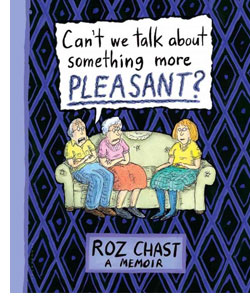 |
 Roz Chast
Roz Chast
Can't We Talk About Something More Pleasant?
Bloomsbury USA
US Hardcover First Edition
ISBN 978-1-608-19806-1
Publication Date: 05-06-2014
226 Pages; $28.090
Date Reviewed: 07-08-2014
Reviewed by: Rick Kleffel © 2014
Index:
General Fiction
You'd think that living here in the 21st century, we'd be comfortable with death. It's not as if we haven't seen enough of it. But everyday, natural, he-lived-a-long-life-and-then-dropped-dead death gives us the heebies to the point where we've let ourselves be convinced that anything is better. Plus, there's a healthy profit in tending to those who might otherwise have died but can be kept alive long enough to cash out every penny they had ever scrimped, saved and hidden away for that rainy day. If only it were just a day.
In 'Can't We Talk About Something More Pleasant?' Roz Chast tackles the subject of death in America, in the 21st century, head-on, in a personal, powerful poignant tour-de-force graphic memoir. The astonishing success here is that Chast manages to do so without being grim or glossing over the hard stuff. It's all here; the humor, the sweetness, the hard decisions, the slow decline, everything that most of us have to look forward from both sides of the equation. Chast crafts an emotional victory as she tells the story of how she cared for her parents in the years before their passing. The truths of the matter might not set her free, but she articulates love in its most difficult moments with elegant grace. And she paints a particularly clear portrait of a society that is defeated by death, unable to talk about it, but plenty willing to profit from it.
Chast's story unfolds in 18 straightforward chapters, from "The Beginning of the End" to "The End." She starts her story when she visits her parents' house and notices GRIME, in a page that speaks to her powers both as a writer and an illustrator. Clearly, her parents are no longer up to the challenge of taking care of themselves. Chast is charmingly and sometimes, alarmingly, honest about her life and her relationship with her parents; she makes no pretense of perfection. The result is that for the reader, everything that follows has more impact.
Chast tells her story in a sort of scrapbook style, with standalone pages punctuating longer pieces, but keeping every chapter focused on its topic as she moves the overall story forward. It's an incredibly involving and detailed work of storytelling architecture. In any moment, it's at once folksy and fun and raw. But step back and you realize just how carefully crafted the whole is. It's a superbly sophisticated whole from cut scraps of life so real it aches.
The balance between art, comics and prose is an integral part of Chast's creation. Once again, expect a complicated architecture that does not seem as such because as a reader, you're simply immersed in each scene. That it all fits together so smoothly is something you never think about, and this is the ultimate testament to Chart's artistry.
The character focus here is quite tight. Roz, her mother and her father dominate the story, with some cameos by caregivers. But in spite of her concentration on her parents, and even their own lifestyle, Chast's narrative never seems claustrophobic. Her mother and father are created with depth and clarity. Her mother is more the leader of the family, while her father is more of a retiring scholar. Chast does a great job of showing each of them alone and making a careful differentiation between their characters alone and who they become when they are together.
Chast wisely refrains from making any social commentary of her parents' story, with the result that readers are left to draw their own conclusions. This is particularly true with regards to the question of money. Chast deals with this, in detail, and it's not pretty. She has a way of making you think things you might wish to unthink. Her "nary a word" approach makes any conclusions you draw about this even more powerful.
There's never any doubt where this story is headed, but Chast's tribute to her mother is especially touching. Her use of prose of art, and the blank spaces on the pages is striking. Even more striking, and only in retrospect, is how this all feels for the reader. The immediacy of Chast's story, and her ability to tell it with raw honesty, let us close the book and feel as if a cherished friend has just confided in us, has told us in detail about the hardest experience in her life. But as the story plays out in our memories, we can't help but become involved. We see ourselves, our loved ones, and our lives — and understand a lot more about the hard decisions to come.
|
 |




